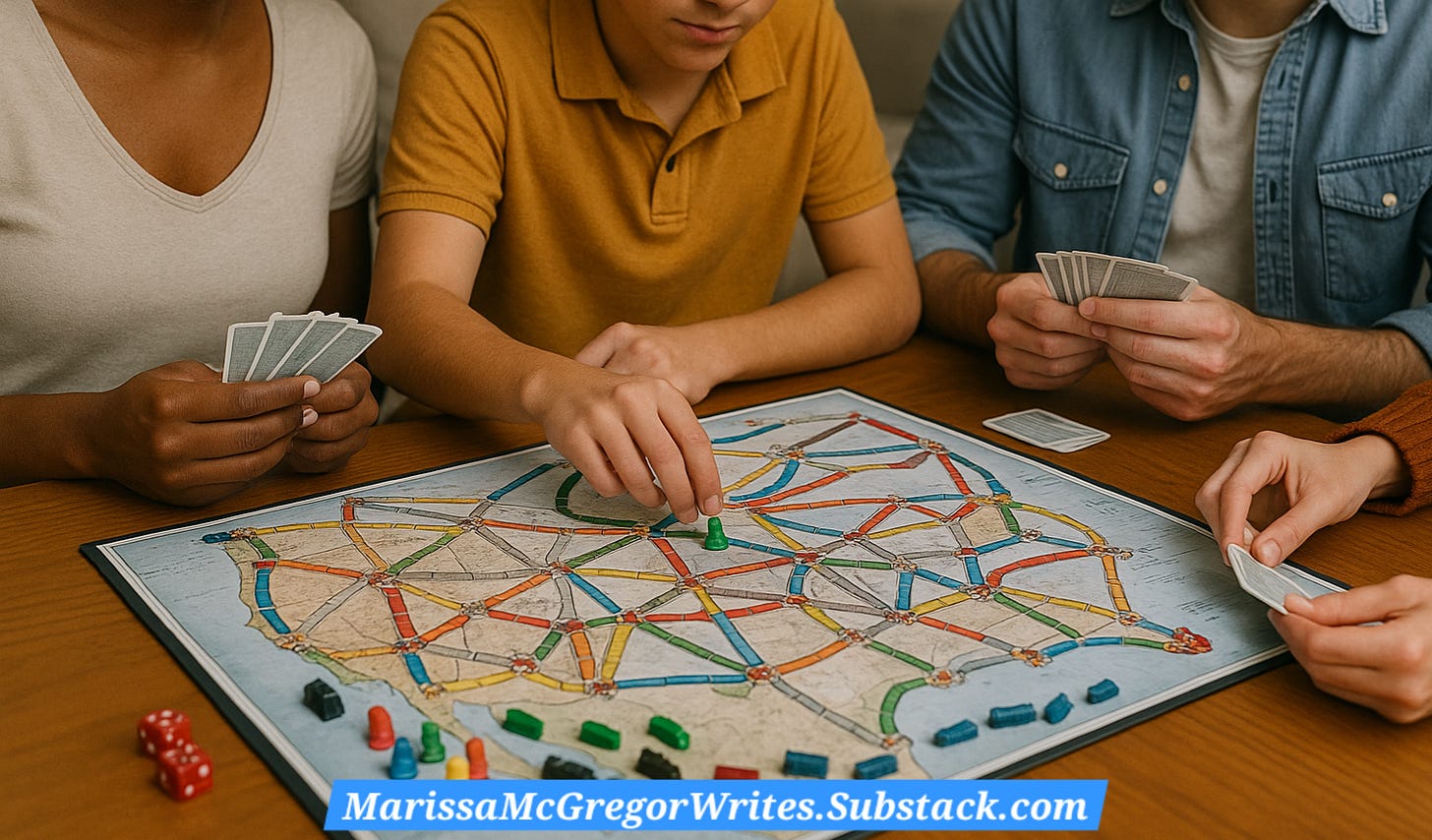Playing the Game
On reparenting myself, even in times of stress.
I don’t know why my son didn’t like her, but it was apparent from the beginning. We were playing a board game—our little family and their much larger family—and she was doing the braggadocious banter of overtly competitive players. The kids were 12 years old.
“Ha!” she called out, landing her game pieces with solid clicks as she moved them across the board. “Watch the master at work.”
“You don’t always have to show off,” he snapped. “No one likes that.”
Our jaws collectively dropped. These kids didn’t know each other. This was our first time playing a game, so “always” wasn’t even possible. Worse, this girl clearly thought my son was cute, fun, and funny—and he’d just hurt her. This was his third sideways comment, and by far the most aggressive.
Rage flew through me with a force I didn’t understand as I heard myself say, “You and I need to have a chat.”
These were my mother’s words. I remembered them preceding many a spanking in a restaurant’s event room, a relative’s bedroom, or sometimes even just outside. These words often came when I had no idea why: I was just happy to be eating out, letting her know I’d finished my homework, or truly not understanding the ritual humiliation my aunt was subjecting me to—and so responding with a joke. Beatings had come at any time, and for any reason in my mother’s mind—and many of them had been exceedingly public.
I’d return humiliated, confused, and not sure what to do—but I was also expected to smile and “be happy.” I was expected to make conversation and be cute. How could a six-year-old—or a ten-year-old, or a twelve-year-old—do all of that to an adult’s specifications? How could anyone?
So I couldn’t blame my son when he said no. It was inappropriate for him to do so, given that he and I had never had one of my mother’s “chats,” but I still understood the impulse to not want to be alone in a room with me in that moment.
I said, “Excuse me?” and I changed my tone. “Son, we need to talk about what just happened. We can’t move forward until we do. C’mon, let’s go.”
He felt the social pressure of the entire table. I felt my heart fluttering, still deep in the panic of my flashbacks. I attempted a reassuring half-smile and a nod.
He reluctantly stood.
My first two strides were angry, strong, and wide. I checked my body language and fought through the panic to formulate words. My son is autistic— a fact we were just beginning to finally understand. The mean-spiritedness in this exchange had been both uncharacteristic and clear, but perhaps he hadn’t truly understood what he’d done. I shifted my perspective toward his to locate a parenting strategy as quickly as possible: What would I have wanted to hear when I knew I was in trouble, but didn’t know what I’d done?
By the time we’d gotten to the kitchen, I knew what I needed to say. I came a bit lower, but not quite to eye level. I spoke as if I was sharing a bit of a secret. I explained that it was important for us to make new friends, so we could do more fun things with them in the future. That girl liked him, and her family liked our family—but they wouldn’t keep liking us if he said mean things in the middle of games. He didn’t know her well enough to make statements on her character, or to be so rude—and he’d cause problems if he targeted her apart from her family. They’d protect her if they needed to, just like I’d protect him.
He seemed to understand. His face softened, and he nodded. He would try to do better.
On the way back to the dining room, I wondered what they’d thought was happening—or rather, I knew it as soon as I saw the fear on their faces. Watching distress fade into relief at my son’s newfound confidence to be kind meant everything to my wounded six-year-old heart.
Did he get it right from there on out? No. It was kind of a mess in the end. But he still tried. We still tried. And in that moment, we were a success.
Despite having been in therapy for the better part of a decade, I’d never been willing to speak about my mother. She’d been abusive, lived a tragic life after the divorce, and died in my brother’s home. I needed that to be the end. I’d also not been too willing to discuss my father, because there were still too many pieces of him I didn’t understand. But recovering from childhood trauma doesn’t always look like sitting in therapy and talking about every aspect of our problems in theory. It looks like working on the results of that trauma as we live our lives every day, fighting through the fear and teaching ourselves—and our children—how we can do better.
About the Author
Marissa McGregor lives in the mountains of central Mexico with her dog, cats, and mare, Pandora. Her writing often starts in the intimate spaces of family and survival, tracing how trauma can echo across generations—and how awareness, even in imperfect moments, can begin to break those patterns. Sheshares this through essays about horses, fermentation, resilience, and the quiet ways we learn to reclaim their lives.
This piece most closely relates to The Book of Iva, a family epic in the works.



